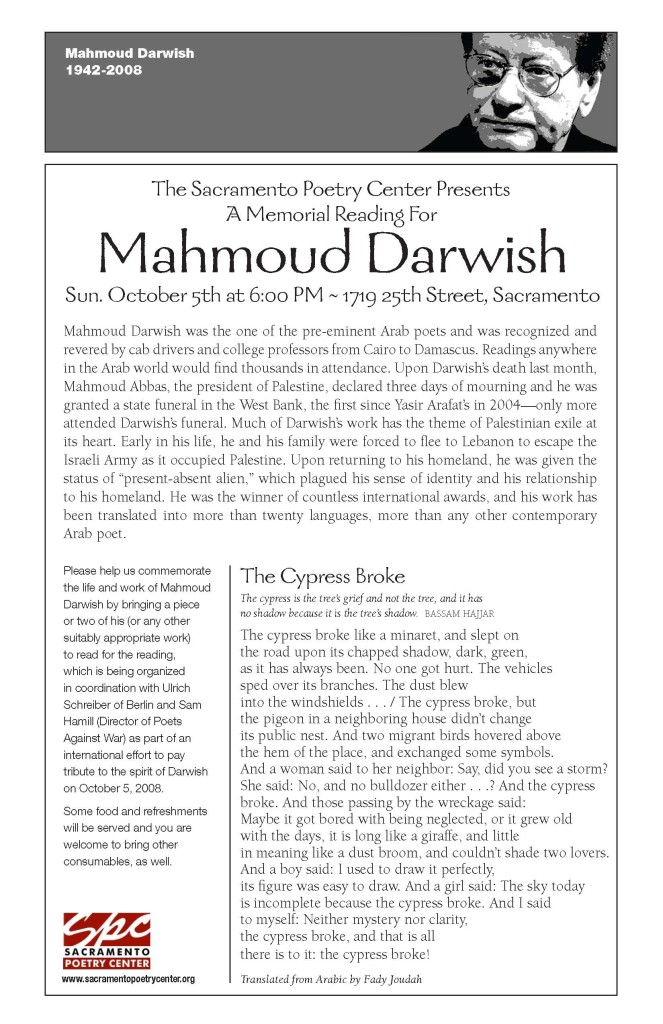In association with the worldwide effort organized by theInternationales Literaturfestival Berlin, a devoted crowd turned up at the Sacramento Poetry Center to celebrate the life and work of internationally-recognized Palestinian poet Mahmoud Darwish.
Shining brightly on the wall via an LCD projector was this handbill designed by Richard Hansen who unfortunately could not attend the event.
Many of the readers commented on the issues of struggle with identity in Darwish’s work. His identity as a Palestinian born in al-Birwa in Western Galilee had been stripped from him as a result of Israel’s non-recognition of individuals who had fled the area during the 1948 siege (when Darwish was 7 years old). This oppression impacted him throughout his life, lived largely in exile after he graduated from high school. His unofficial status resonated with many Palestinians who experienced the same fate. His statement in a poem written in 1962 “Put this in your record: I exist” served as a battle cry and galvanized his reputation. He served as an example of Palestinian identity in his refusal to accept the non-status conferred upon him by the state of Israel.
In much of his work Darwish makes claims of identity only to have them be undermined later in the work. There is little denying that in these undermined assertions of identity his experience is similar to those whose lives go unnoticed, those who are impoverished, those who have been detained, those who continue to fight to have their interests be acknowledged.
In spirit and in word, readers at the Sacramento Poetry Center did their best to pay homage to Darwish’s persistent struggle.
Frank Graham reads “Passport”
Soren Kahl reads “Psalm Three”
Zaid Shlah reads from Memory For Forgetfulness
William O’ Daly reads “Drought”
Rosalie Amer reads “Two Olive Trees”
Carmela Ruby reads “Here the Birds’ Journey Ends”
HERE THE BIRDS’ JOURNEY ENDS
by Mahmoud Darwish
Here the birds’ journey ends, our journey, the journey of words,
and after us there will be a horizon for the new birds.
We are the ones who forge the sky’s copper, the sky that will carve roads
after us and make amends with our names above the distant cloud slopes.
Soon we will descend the widow’s descent in the memory fields
and raise our tent to the final winds: blow, for the poem to live, and blow
on the poem’s road. After us, the plants will grow and grow
over roads only we have walked and our obstinate steps inaugurated.
And we will etch on the final rocks, “Long live life, long live life,”
and fall into ourselves. And after us there’ll be a horizon for the new birds.
(Translated, from the Arabic, by Fady Joudah.)
Poets read many of Darwish’s works in English from Fady Joudah’s translations from the Arabic in The Butterfly’s Burden and Memory For Forgetfulness translated by Ibrahim Muhawi. Some even read some original pieces written for the event:
The Ringtones of Palestine
Is the dream then what forgetfulness chooses? — Mahmoud Darwish
The surplus births of Nablus yearn
to possess any kind of dawn,
yet they are told they threaten
the garden with their ringtones,
their rats’ instincts to chew through
cement walls. Just one rat in
the garden will kill the chickpeas’
peace. Then the aroma of cardamom
fails in the alleys; faces
the clouds cannot model
disappear into a lengthy silence . . .
a phone interrupts. It is The Star of
the East singing something she
promised to the Arab poor.
Another phone plays the song
a piano in Tel Aviv made
when it visited Ramallah.
It visits me here where I belong to
the land of the price of petroleum,
weighed down by my worries
about being able to consume . . .
Maybe I forget what I’m searching for
when I stop in front of the display
cases. Maybe I forget how to dream
in color. Maybe I will never find
the perfect shade of blue for this
room, but it is patient with me.
One dream attaches to another,
and they occupy my memory of
everything I’ve neglected.
One dream attaches to a distant music,
a ringtone in someone’s pocket
rehearsing its tune, the song of
everyone whose homeland
has been surgically removed.
by Tim Kahl
Snatches of audio (his recital of “The Mask Has Fallen”) and video were played to lend Darwish’s presence to the proceedings, and all who attended left heartened by the notion that one important dissident voice had been honored and that for one Sunday evening Sacramento did not feel so isolated.
Thanks to all who came and those who participated.





